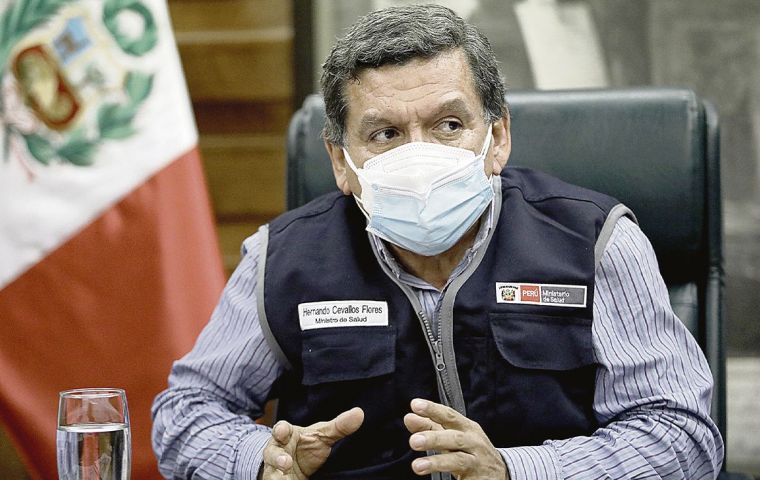MercoPress. South Atlantic News Agency
Peru extends vaccination mandates for indoor spaces and domestic travel
 “Although the vaccine is voluntary, no citizen has the right to infect another citizen,” Cevallos said
“Although the vaccine is voluntary, no citizen has the right to infect another citizen,” Cevallos said The Government of Peru has decided people over 18 years of age who are not vaccinated against COVID-19 will be banned from closed public places as of Monday. The measures include shopping malls, restaurants and banks.
“People who are not vaccinated have a greater risk of catching COVID-19 and then infecting others, so it is necessary to limit their access to public places,” Health Minister Hernando Cevallos said.
Cevallos also explained this measure was a part of the security guidelines that citizens must comply with within a mandatory manner to prevent the spread of the epidemic, which in Peru reports more than 2.2 million cases and 200,000 deaths so far.
According to the new mandate, those over 18 years of age who want to enter a public indoor space must present physical or virtual proof of vaccination in addition to wearing a face mask.
Public transport drivers and collectors as well as those who provide home delivery services will only be able to work if they have taken the drugs.
Authorities have also allowed for an increase in the capacity caps on indoor public places, including a 100% in some restaurants depending on their size.
But capacity at stadiums was kept at 30% and only for people with a full vaccination scheme.
Also starting Monday, unvaccinated people over 45 years of age have been banned from interprovincial travel in a move reportedly aimed at preventing the spread of the disease. Chile is the only other country in the region to have set in place measures this extreme. Since November 1, Chileans need to prove they had taken the two doses at least 14 days before internal travel or have a negative PCR test from 72 hours before the trip.
“If you travel on an interprovincial bus and have to travel for several hours with a person sitting next to you, you have the right to have less chance of being infected,” Cevallos last month.
He insisted that “although the vaccine is voluntary, no citizen has the right to infect another citizen. By not being vaccinated, the chances of contagion are greater”, he added.
Health care workers are also required to have taken both doses as of Monday.
Further restrictions on the unvaccinated are also on the government's agenda, it was reported.
Cevallos also explained foreign proof of vaccination will be valid nationwide for those who have taken their drugs abroad. ”If one has the accreditation of having been vaccinated in other countries, (the document) is also valid in ours,” Cevallos said.
So far 37.6 million vaccines have been applied in Peru, where 16.5 million people have already taken the two doses.




Top Comments
Disclaimer & comment rulesCommenting for this story is now closed.
If you have a Facebook account, become a fan and comment on our Facebook Page!